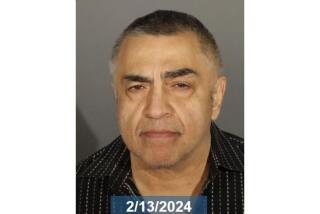Rental Scheme Relies on Provisions of Bankruptcy Law
- Share via
An alleged rent-skimming scheme under investigation by federal authorities has featured massive property transfers to people who have just filed for bankruptcy.
Authorities say participants get deeds to properties in foreclosure by promising homeowners to make their loans current or renegotiate with the lender.
Instead, the scammers allegedly rent the homes and delay foreclosure by putting fractional shares of the properties in the names of people in bankruptcy, or about to file. Under bankruptcy laws, debtors get temporary protection from foreclosure of real estate holdings. While lenders seek the right to foreclose, the scammers can go on collecting rent.
Many of the debtors who filed the suspicious bankruptcies did not bother to show up for bankruptcy court hearings--as officials say they would have done if they had filed in good faith.
Those who did show up often struggled with their English and seemed perplexed about how they got title to scores of Southland homes.
Take the case of O. Suck Kwon, who was quizzed by Deirdre Richards of the Office of U.S. Trustee at his debtor’s examination in 1993. Richards asked Kwon about a house at 19272 Riviera Drive in Walnut.
Q: “How much of that property do you own?”
A: “Actually, no, I don’t know about that one, the details, so, uh--”
*
Q: “Do you own this property?”
A: “Yeah, but only 10%.”
*
Q: “Why did you acquire 10%?”
A: “So I got a deal with my partner.”
*
Q: “What’s your partner’s name?”
A: “Mr. Lee.”
*
Q: “Who owns the other 90% of this property?”
A: “I don’t know exactly about that.”
*
Q: “This property at 19272 Riviera Drive--what’s on it? What’s on the property?”
A: “I don’t know exactly.”
*
Q: “Is it a house?”
A: “I don’t know.”
*
Q: “Have you ever seen the property?”
A: “No.”
*
Q: “How much did you pay?”
A: “I didn’t pay.”
*
Q: “Normally when you buy property you have to pay something. How come you didn’t pay anything?”
A: “Sometimes, you know, as a gift.”
*
Q: “Oh, it was a gift.”
Q: “You have on your schedules that the current market value of your interest is $400,000. How did you get that figure?”
*
A: “Sorry about that, I don’t know.”
Eduardo Omana was questioned by John P. Sharkey of the Trustee’s Office on Dec. 1 about a string of properties that had been put in his name. Included was a house in Fullerton that had been tied up in at least four bankruptcies prior to Omana’s.
*
Q: “Can you tell me first of all when you acquired this property, 133 W. Elm. . . . Did you buy it?”
A: “No. No. This one, it was a friend’s property that I was helping them with.”
*
Q: “So this was given to you as a gift?”
A: “Umm hmm.”
*
Q: “People don’t give me property, real estate, as gifts too often. . . . Who is the friend who gave you the property?”
A: “On Elm Street, who is it? . . . It’s my cousin.”
*
Q: “Now, you have another property here listed at 4858 E. Trimble Street in Long Beach, Calif. . . . How did you come to acquire this property? Did you purchase it?”
A: “No, also it was one of my second cousins. . . . “
*
Q: “That is a very specific type of relative. A second cousin, . . . gave you this property at 4858 E. Trimble Court in Long Beach. I’ll ask you to answer that question yes or no.”
A: “It could be second, it could be third. . . . I don’t want to be specific.”
*
Q: “It’s either a second or a third cousin?”
A: “Probably, yeah.”
*
Q: Have you ever seen the property at 133 W. Elm?”
A: “I have driven by one time, yeah.”
*
Q: “What kind of property is it?”
A: “What do you mean, what kind of property? I don’t understand.”
*
Q: “Is it a house?
A: “It’s a house, yes.”
*
Q: “What color is it?”
A: “Oh God, gray or white--I’m not sure. I’m color blind.”
More to Read
Sign up for Essential California
The most important California stories and recommendations in your inbox every morning.
You may occasionally receive promotional content from the Los Angeles Times.










